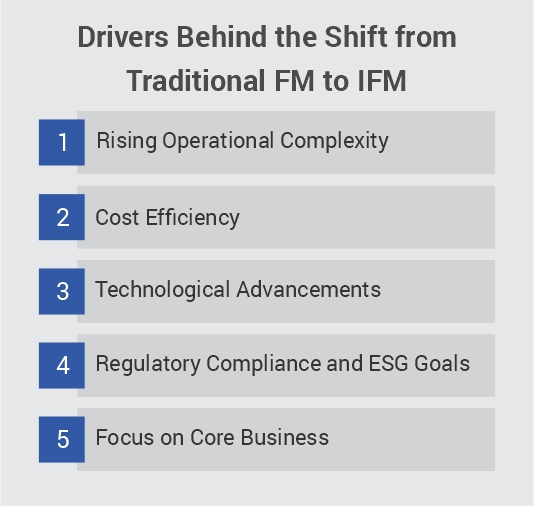The facility management (FM) landscape in India is undergoing a profound transformation. Once characterized by siloed services and reactive maintenance, the industry is increasingly adopting a more holistic and proactive approach—Integrated Facility Management (IFM). As demand for streamlined operations, cost optimization, and sustainability grows, both public and private sectors are shifting away from traditional FM practices toward comprehensive solutions.
This blog explores the evolution from traditional facility management to integrated models, the driving factors behind this shift, and the benefits for businesses looking for top-tier Facility Management Solutions in India.
Understanding Traditional Facility Management
Traditional FM primarily focuses on the day-to-day upkeep of buildings, equipment, and premises. Tasks include:
- Housekeeping and janitorial services
- Security management
- Landscaping and gardening
- Building maintenance
- HVAC and lighting systems care
- Waste disposal
These services are often managed independently, either through in-house teams or multiple third-party vendors. While this model works for basic requirements, it lacks coordination, creates inefficiencies, and increases operational costs due to fragmented oversight and duplication of efforts.
What is Integrated Facility Management?
Integrated Facility Management brings together all FM services—both hard (technical services) and soft (support services)—under a single, centralized management system. It’s a strategic shift aimed at improving productivity, cost-efficiency, and service quality.
Instead of managing separate vendors for cleaning, maintenance, landscaping, and pest control, organizations partner with a single Facility Management Service Provider that delivers all these services as a bundled solution.
Key Components of IFM:
- Centralized contract management
- Unified service delivery teams
- Use of technology (IoT, CAFM, BMS)
- Predictive and preventive maintenance
- Data-driven performance tracking
Drivers Behind the Shift in India
Several factors are influencing this shift across industries in India:

1. Rising Operational Complexity
Modern commercial and industrial spaces are more complex than ever. Managing multiple service providers often leads to poor coordination, operational delays, and inconsistent service quality. IFM offers a single-window solution to tackle these inefficiencies.
2. Cost Efficiency
With growing inflation and resource scarcity, businesses seek ways to optimize expenses. IFM provides economies of scale by consolidating vendors and leveraging automation, resulting in cost-effective Facility Management Solutions.
3. Technological Advancements
The digital revolution in Maintenance and Operations India is driving automation and real-time monitoring. Integrated systems such as CAFM (Computer-Aided Facility Management) platforms enable central control, proactive maintenance, and data analytics—capabilities difficult to implement under the traditional FM model.
4. Regulatory Compliance and ESG Goals
Stringent government regulations, fire and safety norms, and ESG mandates require a more organized and auditable system. IFM providers offer expertise in compliance, ensuring adherence to standards while meeting sustainability objectives.
5. Focus on Core Business
Companies are increasingly outsourcing non-core functions to concentrate on their primary business. By partnering with specialized Facility Management Companies India, businesses can offload the complexities of daily operations and focus on strategic growth.
Key Differences: Traditional FM vs Integrated FM
| Aspect | Traditional Facility Management | Integrated Facility Management |
|---|---|---|
| Vendor Management | Multiple vendors for different services | Single provider for all services |
| Coordination | Fragmented and inconsistent | Centralized and seamless |
| Technology Integration | Minimal or none | High (IoT, BMS, CAFM) |
| Cost Control | Higher due to duplication | Lower due to integration |
| Reporting & Compliance | Manual, siloed reports | Real-time dashboards and analytics |
| Strategic Planning | Reactive | Proactive and data-driven |
Benefits of Integrated Facility Management
Shifting to an integrated model offers long-term value in both tangible and intangible ways:
1. Improved Operational Efficiency
When services are integrated, coordination becomes seamless, delays reduce, and task duplication is avoided. This enhances overall facilities and management productivity.
2. Centralized Control
A single point of contact simplifies decision-making, vendor accountability, and performance evaluation.
3. Predictive Maintenance
Smart sensors and IoT devices embedded in systems can predict equipment failures, reducing downtime and increasing asset life.
4. Data-Driven Insights
Advanced Facility Management Service Providers offer dashboards and analytics to measure KPIs like energy consumption, manpower efficiency, asset performance, and compliance levels.
5. Scalability
Integrated models can easily scale up or down depending on business needs, be it expanding into a new city or downsizing due to economic shifts.
6. Sustainability & ESG
With IFM, companies can monitor resource usage, implement energy-saving strategies, and support green building certifications—crucial for their environmental, social, and governance (ESG) goals.
Real-World Applications in India
Several sectors across India are actively embracing IFM to gain a competitive edge:
1. Manufacturing & Industrial Plants
Large factories and manufacturing units require 24/7 uptime. Integrated FM supports them through automated maintenance systems, energy audits, ETP/STP operations, and rigorous safety practices.
2. Healthcare
Hospitals demand hygienic environments, quick response times, and reliable backup systems. IFM ensures sterilization, biomedical waste handling, and HVAC monitoring—all managed centrally.
3. Corporate Workspaces
Post-pandemic, corporates are focusing on health, hygiene, and tech-enabled office spaces. IFM models offer smart cleaning, touchless systems, and air-quality management.
4. Educational Institutions
Schools and colleges need a clean, secure, and functional environment. IFM covers classroom maintenance, landscaping, security, and cafeteria management.
5. IT & Tech Parks
With high footfall and complex infrastructure, IFM brings in digital tools like BMS (Building Management Systems), IoT, and energy optimization software.
Role of Facility Management Companies in India
As demand surges, Facility Management Companies India are playing a crucial role in delivering next-gen solutions. These companies provide:
- Expertise in diverse service verticals
- Trained manpower and certified supervisors
- Real-time tracking and reporting mechanisms
- SLA-based delivery with penalty clauses
- Customization based on client sector and scale
Top-tier Facility Management Service Providers also invest in continuous training, energy audits, ISO certifications, and green initiatives—ensuring quality, compliance, and sustainability.
Overcoming Challenges in the Transition
While the benefits are clear, the transition from traditional FM to IFM comes with its challenges:
1. Change Management
Organizations must overcome internal resistance and re-train staff to adapt to centralized systems and new workflows.
2. Initial Investment
Though IFM reduces long-term costs, the initial setup involving tech integration and software licensing may appear expensive.
3. Vendor Consolidation
Transitioning from multiple vendors to one requires audits, negotiations, and service-level restructuring.
4. Data Integration
Bringing diverse data points from legacy systems into a centralized platform requires expert handling and robust IT infrastructure.
The Future of Facility Management in India
The Indian FM industry is poised for exponential growth, driven by digitalization, urbanization, and the increasing importance of workplace experience. According to industry reports, the Indian facility management market is expected to grow at a CAGR of 15-20% over the next five years.
Innovations like robotic cleaning, AI-driven maintenance, and smart utility monitoring are shaping the next phase of facility management. The rise of smart cities, sustainable buildings, and hybrid workplaces will only accelerate the adoption of integrated models.
Conclusion: A Strategic Investment
The shift from traditional FM to Integrated Facility Management is not just a trend—it is a strategic necessity. In a world where efficiency, agility, and sustainability are non-negotiable, businesses must embrace integrated models to remain competitive.
By partnering with a leading Facility Management Service Provider, companies can unlock smarter operations, optimized costs, and elevated employee and customer experiences. Whether you operate in manufacturing, healthcare, IT, or education, the move to IFM ensures that your Maintenance and Operations in India are future-ready.
Facilities and management are no longer just about upkeep—they're about strategy, data, and growth.
Industries we serve:
Automobile | Ancillary | Manufacturing | Pharmaceutical | Healthcare | Oil and Gas | FMCG | Education | Real Estate | Commercial
Also read: The Impact of Smart Sensors in Facility Management

